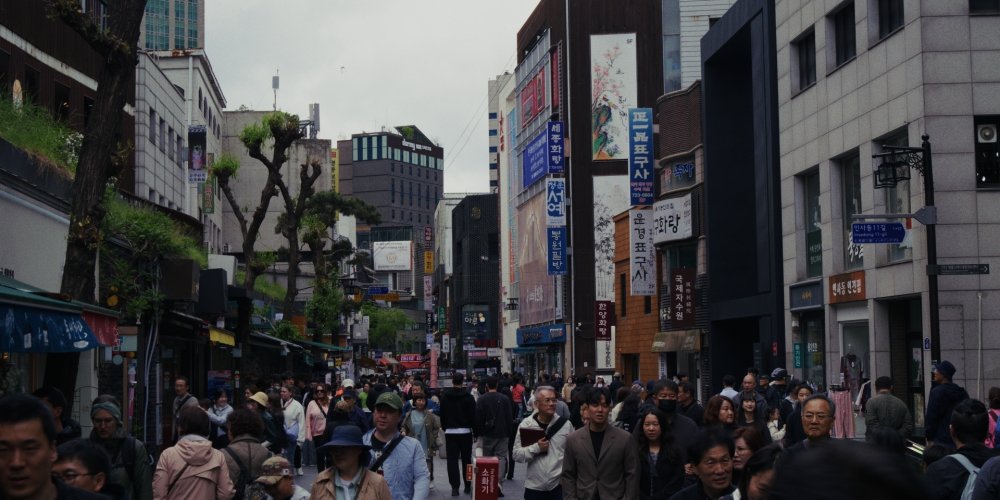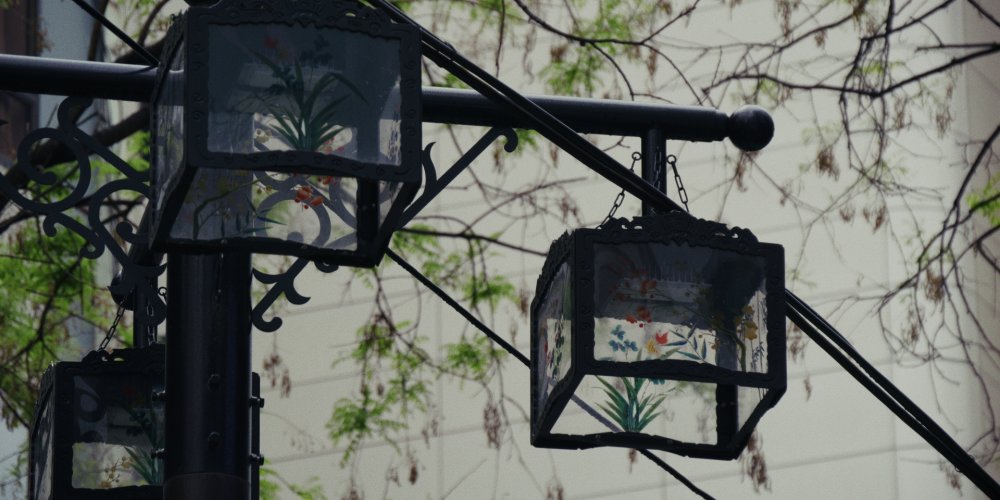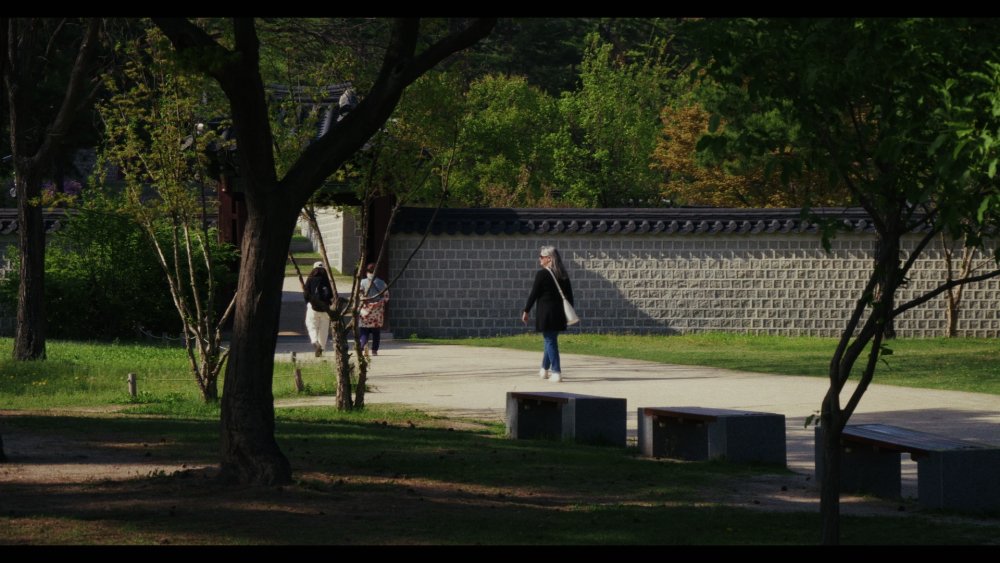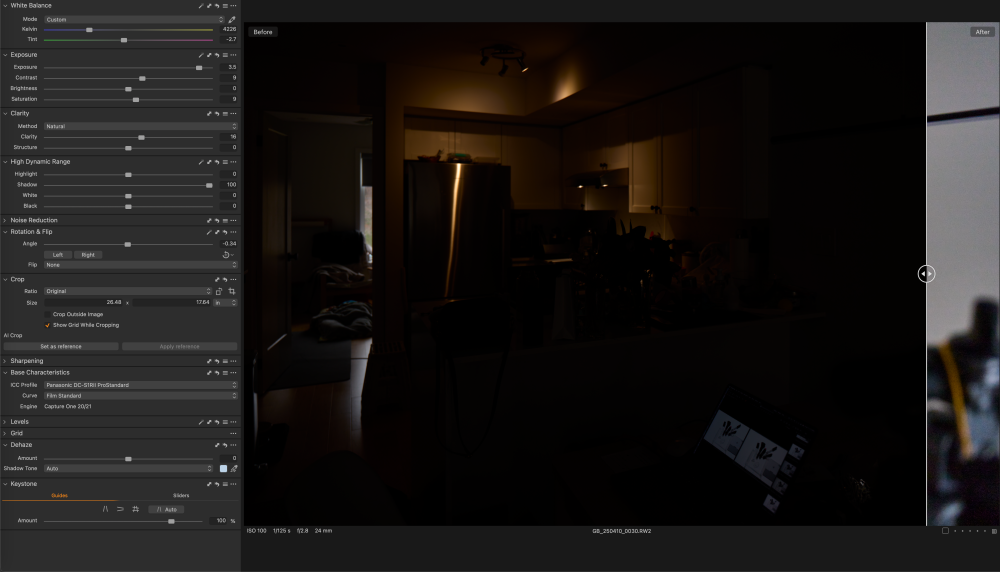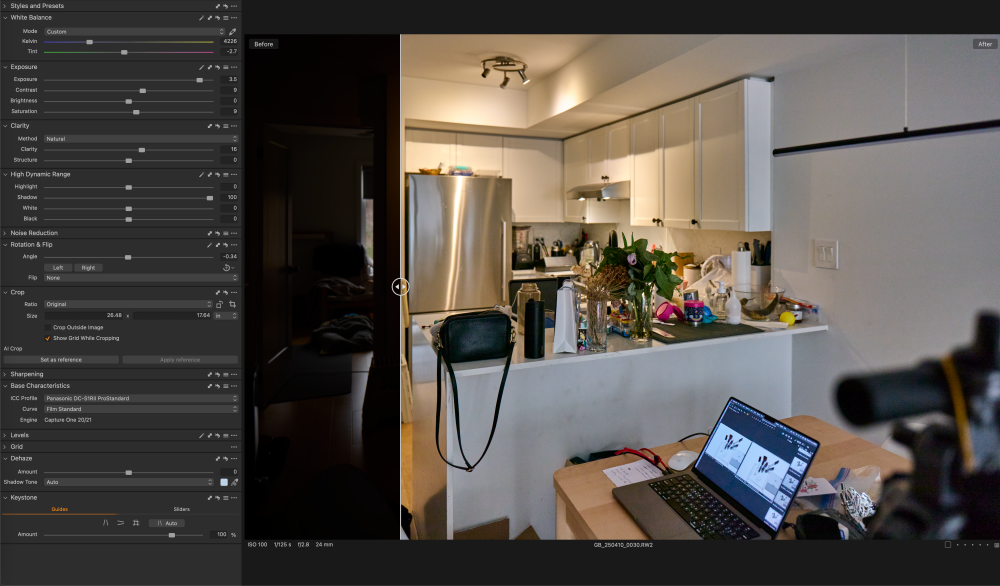All Activity
- Past hour
-
 ita149 reacted to a post in a topic:
New L-Mount Lumix (cinema?) Camera
ita149 reacted to a post in a topic:
New L-Mount Lumix (cinema?) Camera
-
Specs etc only tell us so much. Let’s see them at work. The thing I don’t really understand is whether they’ll have FF 4k 50p. If they don’t that would be a fatal mistake.
- Today
-
 Thpriest reacted to a post in a topic:
New L-Mount Lumix (cinema?) Camera
Thpriest reacted to a post in a topic:
New L-Mount Lumix (cinema?) Camera
-

PC build for editing | davinci resolve
Marcio Kabke Pinheiro replied to zerocool22's topic in Cameras
Just passed through this, and my 2 cents: - If you work professionally, go Mac (and yeah, I'm a windows guy). Even a M1, for video editing, run circles around any price comparable WIndows machine. - If you are not a professional and/or Apple costs 2,5x more in your country than in US (my case are both), Windows is still good. But there is a VERY important point the narrowed a lot my choices, and a lot of people doeas not realize it until is very late - codecs and chroma subsampling support. If you want to edit without proxies, is a must have feature. What H.264 and H.265 Hardware Decoding is Supported in DaVinci Resolve Studio? If you work with h.264, bad luck: only 8-but 4:2:0, except if you get an RTX 5xxx series. If you use H.265, you have better support, but pay attention to the subsampling - the 4070 (and all the RTX 4xxx) does not decode 10 bit 4:2:2. This was my case, and that narrowed my choices (when I did the upgrade, the RTX 5xxx were not launched). I had to buy a Intel non-f CPU (as you) to use the internal GPU enabled just to use Quicksync for decode. For encoding, I did not found a comparable table like this, but since almost all reviews test the encoding (rendering) part, is just to look for the desired card. Ryzens are much more performant (and chepear to build, specially motherboards) but have almost nothing decode support in the iGpus. But a Ryzen with a RTX5xxx card, or an Intel ARC Card would be a choice for me nowadays. In my case, since the money was short, went for a i5-12600k (for good decoding for editing) and a RTX 3060 with 12gb (was better than the 4060 for because of 12gb instead of 8gb - and since I have not hurries for rendering, top performance in rendering was not a problem). Works with Fuji open gate 6.2k in 10-bit 4:2:2 as champ, albeit I only do minor corrections - with a lot of effects it could not be the case. But I saw a guy that made a system with a top i9 processor anda a 4090, but when tried to edit 4:2:2 10-bit, it was slow as hell. But probably was the last PC that I put together - I built all my computer since the 286 days. The new Mac Mini is a steal - for video, is better than a PC costing double the price of the Mac Mini. -
At $3,800, I can't really figure out who is the target market. If I have $3,800 in my pocket and want a hybrid camera, I'm not buying the S1 II. If in the Panasonic ecosystem, it'd be the S1R II. And if not, the R5 II or the Z8. If I don't want a hybrid camera, now they're competing against a Komodo (plus accessories). Komodo isn't full frame, but it's closer to APS-H than APS-C and has global shutter and records in a raw format that I can import to my editor without converting to cDNG. So... what would be the selling point for a camera that will be apparently in an S5-like body, but cost just about the same as a different higher-resolution camera also in an S5-like body? I guess it'll have less rolling shutter if it's the Z6 III sensor. Is "come get a little less rolling shutter" a big selling point in 2025? I get the S9 - cheap full frame with great image quality. I get the S1R II - high resolution full frame with 8k video to compete with the other major players. I could even somewhat get the S1 IIe - if they add "professional" I/O ports like SDI and dedicated timecode, then it's an S5 II that fits better into mid-range shoots. But the S1 II, if described as above? I'm boggled.
-
What if Sony followed The Great Panasonic Strategy handbook? https://www.eoshd.com/opinion/s1-ii-leaks-what-if-sony-followed-the-panasonic-strategy/
-
I'm really looking forward to trying this lens. Come to think of it, I've only have camcorders with superzooms. On the G7, I won't have any options of 1:1 except in 1080p, but I'm going to try it. As a companion lens, I'm getting the 42.5 f/1.7. The whole setup will be completely new for me. Last summer cured me from not having an EVF as I went down to the beach on sunny days and it was absolutely impossible to see the screen on the GX800 or on my VX980 camcorder. I ended up buying, then selling, a E-M5 iii to finish the holiday. I actually liked NOT having to decide between the EVF and the screen, but when you can't see it, the camera is rather useless.
-
There's no wall to good design, or making a body that feels premium and looks like a flagship, Sony for example are not the most creative of the camera companies (that would be Fuji and Sigma), but they managed to produce high-end cameras that are actually high-end with new ergonomics, the a7r V for example and now a1 II. The first a1 is smaller and higher quality than the entry level S5 II body Panasonic thinks is worthy of £3500 flagships. Sony have not just set out to copy Canon, whereas the worrying thing about all of this is that Panasonic seems perfectly happy to be a Temu Sony now. Their product strategy is batshit and they are refusing to put proper cutting edge sensors in the flagships. Then again they are not charging $6000 so bonus points for that. I have no problem with unifying the camera body design around a flagship like Sony did starting with the a7 III adopting the same body as the a9, or at least very similar. Panasonic have done it the wrong way round, they are putting their flagship expensive stuff in a mid-range / entry level body design. I can't tolerate feeling indifferent towards a camera I've just spent 3500 on, I don't know why I should think "meh" every time I pick it up, versus something like a Z8 or a1. Talking about personal preferences, it's not just me - I'd say most people think it's wrong to be releasing the s1r II and s1 II in a mid-range body design that wasn't even very charming at £1300 second hand, let alone £3500. Just a quick TLDR then... - No cutting edge sensors in the flagship cameras - Mid-range at best body designs with no flare or interesting ergonomic features - Terrible marketing and pricing - Autofocus still lagging behind (probably) - Still no internal ND - Not enough compelling unique aspects to make people switch - Marginalised lens mount
-
 Davide DB reacted to a post in a topic:
New L-Mount Lumix (cinema?) Camera
Davide DB reacted to a post in a topic:
New L-Mount Lumix (cinema?) Camera
-
So the rumoured pricing: S1 II: 3500 euros. Similar or same sensor as Z6 III (partially stacked) and similar spec? S1 IIe: 2800 euros for the OLD sensor, same spec as S5 II but updated processor 2800 euros for a 2017 sensor that debuted in the a7 III. The kit lens is 1000 euros. 24-60 F2.8 Panasonic have taken leave of their senses.
-
You have completely misinterpreted what I said and brought up hacks for some reason
-
 Davide DB reacted to a post in a topic:
New L-Mount Lumix (cinema?) Camera
Davide DB reacted to a post in a topic:
New L-Mount Lumix (cinema?) Camera
-
Agreed. I don't know the overall health of the Lumix line. Maybe it's even as bad as people are saying. There have been some big whiffs for sure, like the LX100, the G100, and the G95, but I feel like a big part of people's criticism is that Lumix is "late to the party" on certain things and when they finally do release a camera that matches the competition, it's "too late" even though they enter a market at an extremely competitive price. I get that it is an adjustment, given that Lumix for so long lead the way when it came to progressing what mirrorless cameras are capable of, so it can be a disappointment in that regard, but I think overall we've hit a wall when it comes to advances. No one is really progressing much, outside of higher resolution. But Lumix is adding little quality of life improvements that the larger companies still haven't added, but they don't really get credit for them. I don't think it's unfair to say that 7 years is a long time to release a successor, but at the same time, would people be giving them the same grief if they were releasing a new model every two years for what is essentially a big firmware update like Sony does? Should they do that instead of supporting their cameras for years with new features via free firmware updates like they have? Would they have been better off if they flooded the market with so many different models? There needs to be some middle ground, and it'd be nice if Lumix found it. I agree with this, but also think it was inevitable. I don't know that they are regressing backwards creatively, as much as they hit the same wall most everyone else has. I do think the design criticism is the most valid, but I also think that too was inevitable. It makes sense that they'd try to unify the camera body designs like Sony has, as I'm sure it's much more profitable for them, especially as they try to enter the market at a more competitive price point. I've never had a problem with the S5ii X's body; I don't necessarily love it it, but I'm pretty indifferent. Where it matters most to me I find it to be pretty good; the buttons are where I'd naturally want them, and I have quick access to pretty much every setting I'd want to have quick access to. It really boils down to personal preference, so if you don't like it then I can see why it'd bother you that they are using it for most of their cameras now. That was a big reason why I didn't like Sony cameras, so I understand it.
-
 John Matthews reacted to a post in a topic:
New L-Mount Lumix (cinema?) Camera
John Matthews reacted to a post in a topic:
New L-Mount Lumix (cinema?) Camera
-
The GH2 and the hacking community seemingly launched the GH3 before Panasonic knew which end was up. Times have definitely changed. There's no reason to hack anything on current cameras as they're all great. The urgency has become story, composition, lighting and the edit.
-
 Simon Young reacted to a post in a topic:
New L-Mount Lumix (cinema?) Camera
Simon Young reacted to a post in a topic:
New L-Mount Lumix (cinema?) Camera
-
This is actually a pretty decent video... The X1500 and X2000 are the same camera, just without the top handle. He compares/matches it with the S5ii X. It's pretty close. Just the low light isn't good.
-
Maybe try and understand the negativity, after all we're just doing as you just described... buying and using the cameras and giving our opinion. I have bought every major Panasonic release for 15 years. I stopped at the S1R II and gave my opinion. There's no creative or practical and financial reason to buy another L-mount camera from Panasonic. My next will be the Sigma BF and I'll probably get the Sony a1 again at some point, as I regret selling it. There's no room in the bag for a £2500 Sony a7 replica with L-mount. Had Panasonic used the same strategy in the M43 days, they'd have been bringing out 2x crop DSLRs with moire.
-
 Thpriest reacted to a post in a topic:
New L-Mount Lumix (cinema?) Camera
Thpriest reacted to a post in a topic:
New L-Mount Lumix (cinema?) Camera
-
 John Matthews reacted to a post in a topic:
New travel film-making setup and pipeline - I feel like the tech has finally come of age
John Matthews reacted to a post in a topic:
New travel film-making setup and pipeline - I feel like the tech has finally come of age
-
I have had this in and out of my shopping basket many MANY times but in the end have stuck with MILC. https://www.amazon.fr/Panasonic-Caméscope-Semi-Pro-HC-X2000E-Stabilisé/dp/B083SZZ5KR/ref=asc_df_B083SZZ5KR?mcid=232efbbab9903b8186ad70a336860e1b&tag=googshopfr-21&linkCode=df0&hvadid=701550460967&hvpos=&hvnetw=g&hvrand=4438915473122340787&hvpone=&hvptwo=&hvqmt=&hvdev=c&hvdvcmdl=&hvlocint=&hvlocphy=9109877&hvtargid=pla-898734561985&psc=1&gad_source=1 But it would make a lot of sense for static duty. The deciding factor for me was mixing in and editing the footage alongside full-frame MILC and I'm a bit OCD in not liking that. Even using my drone footage triggers me but no realistic option on that one!
-
Agree. Mostly... It's that they 'appear' to be going backwards creatively as in terms of features compared with others (or others are catching up) and especially in design. I have never really cared for the Lumix f1.8 primes but have always respected them...and now own and use 3 of them! I'm one of those who is not bothered whether they make anything smaller or not because on an S9, realistically, unless they make them slower, how much smaller could they be and they are hardly big or heavy in the first place. Mostly the el cheapo 50mm f1.8 for 90% of the time.
-
The 14-140mm allows you pretty much to shoot whatever compositions you can see. There were a few shots that required longer than 140mm, but by the time I add the in-camera zoom to get a 1:1 crop in C4K it's at 179mm, then stabilising in post makes it more, and then I can crop in post further, so that pretty much covers it. I only swapped to the 7.5mm lens once, which was an absolute PITA by comparison. In terms of the screen vs EVF, it's really a toss-up. The EVF can be more stable because it adds a third point-of-contact, but it really makes people aware you're shooting at them, even from far away, and it forces you to shoot from eye-level too. Shooting using the screen (tilted up) allows for shooting from chest-height, which I find much more pleasing for people shots, and is less noticeable too. The added complication is that the EVF can be adjusted so I don't need my reading glasses, and can read all the information on the screen. In practice I'm still figuring this out, but it created a few combinations that seemed to work. If it was bright out, I'd wear sunglasses, and shoot people from chest height just using the histogram and zebras to expose and peaking to confirm the AF was good. Then I'd use the EVF when I was zoomed in far away or shooting up at buildings etc which benefitted from the extra stabilisation. If it wasn't bright then I'd use the EVF for the same zoomed shots, and when I wanted to shoot people from chest height I'd put on my reading glasses and be able to see the screen just fine. If I quickly wanted a chest-height shot I could grab it without putting my reading glasses on first, as the AF and on-screen tools are so intuitive.
-
You're very right. Read what people say and Lumix anything is DOA. Nevertheless, people will buy them, actually use them and give their opinions. Also, all the cameras are so good and I'm struggling to find meaningful things that would really improve something. Sure, internal ND's would be great, but I'm sure there are all kinds of technical issues with that. Now, we've got HQ magnetic ones that aren't that bad at all. Rolling shutter performance is the biggest hoax for the vast majority of people buying the cameras. All of the nth degree stuff- just go out and shoot what you have. Better yet, downgrade and make it a challenge.
-
 John Matthews reacted to a post in a topic:
New L-Mount Lumix (cinema?) Camera
John Matthews reacted to a post in a topic:
New L-Mount Lumix (cinema?) Camera
-
That really speaks to me. I've also heard it being described as the scene being a "menu" and you need to take something on it, only the most interesting parts. The 14-140mm does that nicely. With the GH7, are you finding yourself using the EVF more or the tilt-up screen for most of your travels? I'm guessing the EVF.
-
 John Matthews reacted to a post in a topic:
New travel film-making setup and pipeline - I feel like the tech has finally come of age
John Matthews reacted to a post in a topic:
New travel film-making setup and pipeline - I feel like the tech has finally come of age
-
I see so much negativity towards Lumix right now, but the S5ii X is my favorite camera I've ever used despite my criticisms of it, I was very impressed with the S1Rii when I used it for a day, and I think the S9 is a very compelling option especially if Lumix creates smaller lenses like they've said. I've even seen more YouTubers switching to Lumix cameras; while that isn't important to me, it's a sign that they are making some headway. I'm not saying people's criticisms aren't valid. If they aren't the right tool for you then they aren't the right tool, but people are writing off cameras based on specs instead of actually using them. Maybe these S1 successors will suck. It's very possible. But as of now, no one who has actually used them has said anything, nor have they made their way into the paying public's hands who can give an unbiased review.
-
This. Build hype by drip feeding interest over a period of time, each time highlighting strengths such as in this case, compact size. By doing this, you prevent unrealistic or totally wrong expectations regarding what is being released. And then, don’t release it with an f8 lens and expect anyone but paid shills to rejoice because you are only kidding yourself and allowing your already shaky reputation to plummet. I can imagine and think a lot of the criticism of this camera is unwarranted and it is being somewhat underrated. I think this is due to a couple of reasons. 1. As above, Lumix are terrible regarding marketing and managing expectations. It’s as if they don’t pay any attention or care about their customers and so no matter how good one of their products is, they are already on the back foot before it’s even unveiled. They need to address this. Unless it’s already too late. 2. It wasn’t a successor to the S1H. Here at least, - I’m not so sure what the wider world wanted but I’ve read a pretty overwhelming wish in a number of places for an ‘S2H’ above anything else. 3. I do think they got the naming wrong and therefore the expectation of this all wrong and it is an S5ii on steroids rather than a successor to the S1R. The S1 line was a bigger and better built ‘pro’ line of cameras. The S5 line is less than that. Don’t pretend something is other than what it is because people are not stupid and you will just piss them off and alienate them otherwise. 4. It is a very conservative design. As I have said before and stand by the sentiment and that is, I would buy this camera for what it is and what it can do, despite the furore and the fact that I don’t think it’s a true successor to the OG S1R. The only reason I have not and am unlikely ever to do so is because I already have something I consider at least equal, if not slightly better (Sony A7RV) for my needs and the lens options are in a whole other league. But I always come back to the same thing and that is Lumix’s managing and marketing just comes across to me as nieve at best, willfully destructive at worst. It’s like they are hell bent on reducing their 5% market share and that makes no sense.
-
Thanks for the kind words @John Matthews and @ac6000cw .. I welcome the change of talking about the creative possibilities that the equipment affords us in using it, rather than just discussing it in theoretical terms. I'm now back home and starting to reflect on the trip, and one theme is that the more I use the 14-140mm the more I like it. For travel, where moving fast and having the flexibility are important it really shines. The length really seems to be an asset and I mentioned before that I ended up using the long end more than I thought I would, but let me expand a little on that. They say that painting is the art of addition, and photography is the art of subtraction. In painting, you have full control of the canvas and therefore getting nice frames is about starting with a blank canvas and deliberately adding the things you want it to contain. Whereas photography starts with the entire world, which for most purposes normally contains far too many things, which means either you physically remove those things from the composition you're photographing, or you change your location and focal length to exclude the items you don't wish to include. Obviously you can't just take a scene line the below, ask everyone to leave, remove all the signs on the buildings, remove the trees you don't like, etc, just to get a nice composition... So the answer is to find the elements you like, position yourself so that they are lined up, and then zoom in to get the composition you like most, like the below for example... I don't normally post shots of my travel companions because they're not keen on being posted on the open internet, but here's a good example shot of what a zoom is great for - seeing something and quickly capturing it. Yes, you can do this with primes, but very few people are going to travel with a 135mm MFT prime or 300mm FF lens, and even if they did they likely wouldn't be able to change to it fast enough to grab a composition like the below, and even if they could the likelihood that the FOV would end up containing all the right elements in the right proportions is very very low.. This also gives a small insight into for far behind my wife I will get while stopping to shoot this and that, so speed matters in the sense that she might walk so far ahead I might never find her again! I also find that in the edit the variety of focal lengths gives the footage an element of variation that I really like. For years I shot with a 35mm equivalent as my main lens, only swapping to other lenses when there was a good reason and time to do so, and I found that after a while I started to dislike the "one perspective" feeling the footage had. It's a valid creative choice, and if that's the feeling you want for your videos then that's great, but it's not the feeling I want on all my videos.
-
I will. Yes, the low-light issue can't be denied. I already have a bunch of lighting, so I'm not too worried about that. These new 1 inchers do seem quite nice and just as in photography the ISO and noise algorithms have advanced in the videocamera world. There are workarounds for bokeh, as you say. When I used those old Mini DV cams we managed to produce some nice images by playing with length of the zoom and judicious placement of our subjects. I 100% agree with you that the video cam world has advanced at a snail's pace compared to the photo world. Advancements have been few and far between. Curiously enough, Panasonic really did innovate with the DVX200 but the competition from the DSLR world and the new MILC challengers proved too fierce. Heck, even their own internal competition was brutal with the GF7, GX80, G9, FZ-2000, GH5, GH5 and GH5s coming around near the launch of the DVX200. Those guys in Japan were on a roll back then. As Andrew has said, their photo demise in near. IMO their fatal flaw was launching their own L mount and trying to compete with much more well established players but with 1/100 of their marketing resources and distribution channels. They should have stuck with videocameras and, from time to time, integrate their innovations to the M43 line. Bleh. Right now they much interested selling batteries to Tesla and Toyota.
- Yesterday
-
I'm saying this respectfully to everyone else's opinion here, but there is a lot of difference between spec and actual usage. The S1Rii has been a dream so far in use, sure the body is not as elevated feeling as the OG, but in actual use it's probably one of my all time fav overall. The sensor output is fantastic, See below, this was a random snap and just for fun I decided to see if it could be salvaged (excuse the messy house/ I have 2 little kids), Results are better than anything I've ever shot with except for maybe the GFX series, (but very close) As well the sensor for my liking just sings with my vintage glass, the portrait is with a 58 Hellios from a commercial shoot. I know they may be lack lustre on the spec page, but in actual use, they just deliver.... hence I have more Lumix's in my bag along with a canon and fuji!
-
Yeah, smaller sensors really don't bother me EXCEPT in the low light department. 1" was the minimum I was willing to go, given I would be shooting in a lot of lower light situations without professional lighting. If you WERE looking for shallow depth of field, it's obtainable with a little work. I tested dozens of camcorders when starting my streaming business in 2016. The DVX200 was by far my favorite, in terms of both use and image, but was just too expensive. So we went the Sony PXW-Z70 route, since we needed 4 and they were half the price of the DVX200 at the time. The DVX200 was an excellent camera, but it's $5000 price tag wasn't feasible for us. If I was going with a camcorder today I think I'd go with the DVX200 myself. It's everything I love about Lumix cameras, but in a camcorder body. Camcorders really haven't progressed much in the last 10 years. Even the newest models have specs that are essentially the same as the 10 year old DVX200, and most of those are in the $3000 and up price range. The biggest changes since have mostly been 4k60p (DVX200 has that), 10-bit, and more robust streaming options as that's the primary use for a lot of these cameras these days. Most of the "professional" camcorders in your price range that you can get new are the handycam style and don't really have many more buttons than you'd find on a mirrorless camera. That might not be so much of an issue though if your primary reason is just wanting that ability to power zoom. JVC also has some decent spec'd cameras for very reasonable prices new, but I'd definitely try them out before going that route, as the camcorders that I did try of theirs were very plasticky. I just wasn't convinced of they'd stand up to heavy use in a combat sports environment. Even the LS300 cinema camera they came out that I owned and loved was very plasticky. Plus their menus were straight out of the 90s! Frankly my experience starting that streaming company was the reason I ditched camcorders for mirrorless in my other video work. It was hard to justify paying a lot more for a camcorder that was less capable than mirrorless cameras that were half their price. Plus they were just more versatile, being able to change lenses. But boy do I miss those nice chunky camcorder bodies with all buttons on the side of the camera that you needed to change settings without having to dive into the menus. Not to mention the power zoom! Keep us posted and share your thoughts on what you do get!
-
I have no idea how marketing really works or what effective marketing looks like (sales, of course, but I have no insights there). But in theory, leaks get people all psyched to watch the release video. It gets them free airtime on dozens of podcasts, discussions on tons of message boards, etc. The real problem comes when the hype has been cranked up to ... well, a solid 7.3 (it is Panasonic, after all) and the release is a 4. If people are hoping that Panasonic is about to drop an S1H II and they come out with the S9, there's instead unhappiness and backlash and almost all of the release day coverage is people complaining about the camera. And then, like the S9, people start to come around and say "Oh, that's actually a nice camera." If Panasonic just teed up "we have a new ultra-small camera for creators coming," the day 1 reception might be delight instead of dismay!
-
I've debated myself the aesthetic qualities of small sensor videocameras. At this juncture I'm willing ti sacrifice overall "bokeh potential" if the videocamera is more practical than a DSLR/MILC for video. Yep, coincidentally I'm finding that DVX200 one of the better options out there. It definitely ticks all the boxes. As for the Sony, I didn't even know to existed. I'll def have a look at it. Not really a Sony fan in the photo world, but they have produced very good vide cams for decades, so that seems like a really good option. All those cinema camera sound great, but I'm looking for extreme practicality with an integrated zoom lens. So I'm gonna pass on those big censored fiends.





